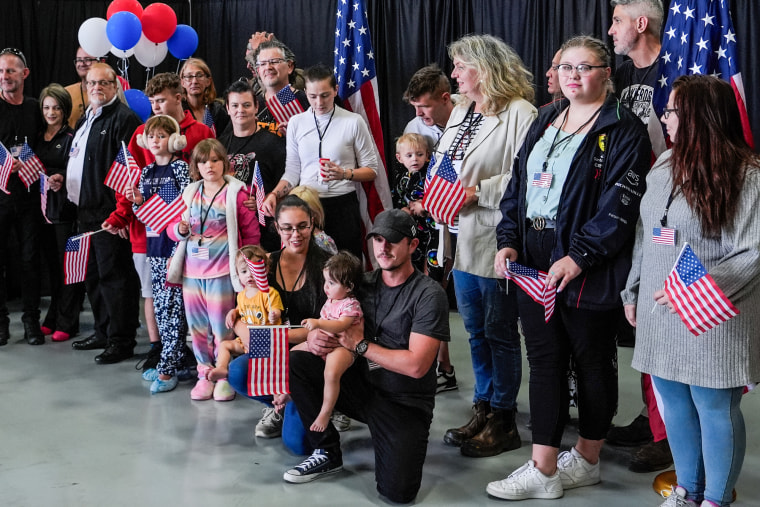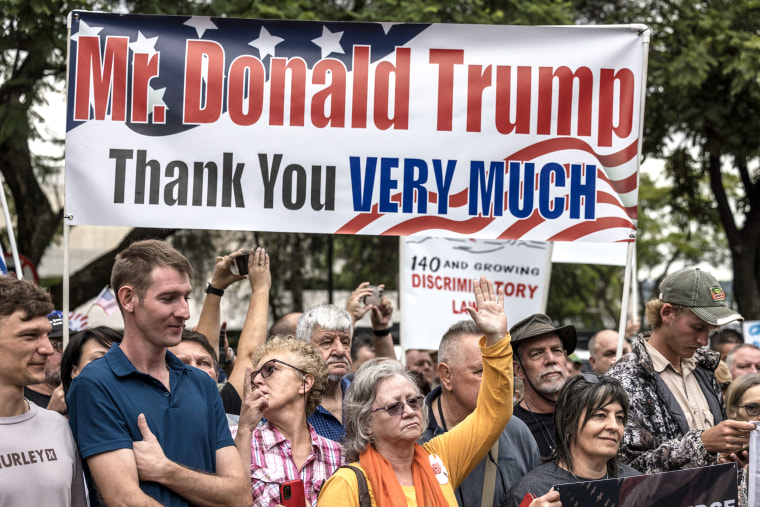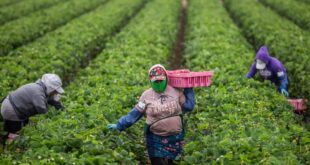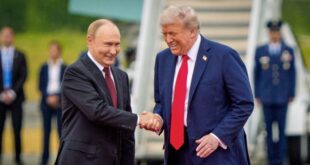
A day after 59 white South Africans were welcomed to America as refugees, more than 86,000 South African farmers — who are mostly white — are gathering this week at the NAMPO Harvest Day trade fair, an annual agricultural exhibition considered the largest in the Southern Hemisphere.
Over four days, the attendees will discuss innovations in technology, collaborations and various other elements of an industry that last year generated nearly $14 billion in revenue.
Notably, according to one participant, there is no planned discussion of violence against white farmers or “Afrikaner refugees escaping government-sponsored, race-based discrimination, including racially discriminatory property confiscation” without compensation, as President Donald Trump wrote in a Feb. 7 executive order that opened the way for the 59 South Africans to come to U.S., despite a ban on refugees from other nations.
The executive order referenced South Africa’s Expropriation Act enacted last year, which in some cases allows the government to seize unused land without compensation, something Cyril Ramaphosa, the country’s president, said has not happened.

The act awakened a profoundly troubling argument over land rights. South Africa’s dark history of racism includes the confiscation of land from Black residents, both before and during the apartheid. Afrikaners, the minority white descendants of Dutch and French settlers who arrived in South Africa in the 1600s, were leaders of the apartheid regime that ended in 1994.
The purported goal of the Expropriation Act is to shrink the vast land ownership disparity that came with the oppressive rule. According to the organization Action for Southern Africa, 72% of farms and agricultural holdings are owned by whites, who make up 7.3% of the population. Black Africans, representing 81.4%, own only 4% of the land.
Trump asserted on Monday, ahead of the refugees’ arrival in the U.S., that “white farmers are being brutally killed and the land is being confiscated in South Africa.”
Yet Wandile Sihlobo, chief economist of the Agricultural Business Chamber of South Africa, said that the spirit of NAMPO this week reaffirms that “genocide” of white South African farmers “was imaginary and not happening in our country.”
“We’re all disturbed that the U.S. side is alleging that there’s genocide and mistreatment of white farmers in South Africa. It is incorrect,” said Sihlobo, who is also co-author of the book “The Uncomfortable Truth About South Africa’s Agriculture.”
“If anything, the sector continues to flourish. [Trump’s] comments are misinformed and not mirroring the reality on the ground in the country,” he said.
The New York Times reported 225 people were killed on South African farms over a four-year period ending in 2024. Of those deaths, 101 were Black current or former workers living on farms, and 53 were farmers, who are usually white.
Nico Harris, a farmer of Afrikaans heritage, told Daily Maverick South African newspaper that the problems he sees can be overcome and stem from the government not being “pro-farmer.”
“I think the refugees that have gone [to the U.S.] are not well-established family farming businesses like we are,” Harris told the paper. “I think they don’t have an opportunity in the country and they might think that, ‘This is an opportunity for us.’ I don’t think they’re really fleeing because they are scared or worried, I think they see it as an opportunity.”
Harris added, “I think there are racially discriminating laws against white farmers, and I think they have problems and haven’t got sympathy from the government. But there are no real land grabs, and I don’t think there are real threats. There are individual farm attacks, but it’s more related to criminal activity. We just hope our government is going to wake up and realize that they need the farmers, Black and white.”
One of the South Africans who arrived in the U.S. on Monday told The Washington Post that she had been advised not to speak with the media and said it had been a “very emotional, very rough couple of weeks.”
Theo Boshoff, CEO of AgBiz, which represents companies across the agricultural value chain, including South African and multinational companies, said crime in rural farming areas is high but “not targeted against any racial or ethnic group.”
“There is no genocide in South Africa,” Boshoff added. “People who live in rural areas, who are often farmers, are simply more vulnerable to crime and violent crime because they live in remote areas.”
And because they are remote, law enforcement often is not nearby to protect them. “There is no cultural or racial bias at play. White farmers, Black farmers, white farmworkers, Black farmworkers are all equally at risk and united in combatting this challenge,” he said. “I also don’t agree with insinuations that rural crime is motivated by politics or in any way related to South Africa’s affirmative action efforts to remedy our checkered past.”
Solidarity, a South African trade union that represents 600,000 Afrikaner families, said in a statement in February that it does not agree with the African National Congress, which wants to close the farmland disparity gap. “But we love our country. As in any community, there are individuals who wish to immigrate, but repatriation of Afrikaners as refugees is not a solution for us,“ the group wrote.
President Ramaphosa said on X that the country’s laws “balance the need for public usage of land and the protection of rights of property owners.” He said that a meeting with President Trump about the country’s land reform policy would result in them sharing “a better and common understanding over these matters.”
Trump adviser Elon Musk, who was born in South Africa, has talked of his home country having “racist ownership laws” in a genocidal effort against white farmers.

Fadial Adams, a member of the National Assembly of South Africa, a political body that passes legislation and analyzes executive action, warned of Musk’s influence on the president. “Let us not forget that Elon Musk is a beneficiary of our suffering and our slavery in South Africa, and it is not something that he hides. He was raised on a system which benefited white South Africans exclusively,” Adams said. “Elon Musk should stop acting like the minister for foreign affairs for South Africa. He’s not.”
The Trump administration and Musk representative did not respond to a request for comment.
Afriforum, a nongovernmental South African agency that supports the interests of white citizens, have called for farm murders to be classified as priority crimes requiring special attention, like gender-based violence or rhino-poaching. It does not support the Expropriation Act.
“Many laws identified by the Afrikaner lobby groups as racist are viewed by the African National Congress as being necessary, intentional measures to redress past wrongs,” said Thula Simpson, an associate professor of history at the University of Pretoria in South Africa. “So the present developments strike at the heart of the post-apartheid consensus.”
As for the farmers in South Africa as a whole, Sihlobo, the economist from the Agricultural Business Chamber, pointed at how the country’s earnings from exporting produce have grown from $2 billion in the year 2000 to nearly $14 billion in 2024.
“We’re self-sufficient,” Sihlobo said. “That speaks to the progress the sector has been making. You can’t see numbers like that where there’s a genocide.”
Jaco Minnaar, the chairman of AGRI SA, the largest agriculture organization in South Africa, says the larger problem is South Africa’s crime rate.
“We can see that farm murders in South Africa have a slightly higher rate per capita than murders in general, but it’s farmers and farmworkers, which is not all necessarily white,” Minnaar said.
“Our murder rate is one of the highest per capita in the world, even higher than some of the war-torn countries. That’s something that we need to address,” he said. “But we can’t specifically see from the statistics that white people or any other demographic group are targeted. Or that there’s a genocide.”
 Latest World Breaking News Online News Portal
Latest World Breaking News Online News Portal






